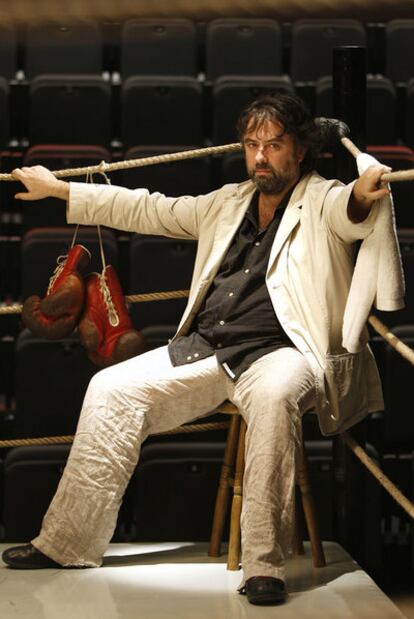"Falstaff is real; he goes beyond Shakespeare"
Director Andrés Lima on his new show about the pot-bellied provocateur
Andrés Lima was captivated by Falstaff's rotundity and bohème maudit aura. The theater director, playwright and actor, whose career has gone hand in hand with the renowned alternative troupe Animalario, is accustomed to turning characters on their heads. That is why his presence is in increasingly high demand at playhouses across Europe.
This time around, Lima has handed Shakespeare's famous character his emancipation letter, and the result of that freedom is opening at Madrid's Valle-Inclán Theater in a production where he is the director, co-adaptor and one of the 15 members of the cast.
Ever since the project started taking shape following a commission by the National Drama Center, Lima considered the option of personally taking on the part of the drunken, pot-bellied provocateur. Yet at the same time he wanted to direct the play with serenity. Time was of the essence.
"I finally opted to have him played by Pedro Casablanc, who is a great actor, but I reserved for myself an experiment that allows me to be both inside and outside [the story] and to be the connecting thread," says Lima about his own character, El Rumor (The Rumor), a narrator of sorts who is anything but objective.
In any case, Lima claims that Sir John Falstaff is far more important than a mere character.
"Falstaff is real; he goes beyond Shakespeare, he is life itself, with all its greatness and misery. Falstaff is my hero."
Then, after a pause, he rephrases the statement: "Actually, he is my favorite anti-hero; he takes everything in life right to its final consequences, accepting the risks and dangers of solitude, illness, marginality; he is an idea more than a person. He is the idea inside of people who have to battle political intrigue and thirst for power."
This version incorporates both parts of Shakespeare's Henry IV, Richard II and Henry V, as well as a few tributes to The Merry Wives of Windsor.
"We tried to go straight to the essence of the political plot, but there's also the tavern plot, full of Brechtian and esperpéntico overtones," he adds, in reference to the deliberately grotesque characters created by the Spanish early 20th-century playwright and novelist Ramón del Valle-Inclán.
In this production, with music by Nick Powell, the story focuses on two concepts: interest and truth. "Falstaff is betrayed; this happens because of personal interests, because of ambition; his own death makes him eternal. There is something eternal and legendary about him, and that is why I bring him back from the dead in the end, because he will always be there."
Falstaff. Until May 1 at the Centro Dramático Nacional, Teatro Valle-Inclán, Metro Lavapiés, Madrid. See http://cdn.mcu.es for tickets and more information.

Tu suscripción se está usando en otro dispositivo
¿Quieres añadir otro usuario a tu suscripción?
Si continúas leyendo en este dispositivo, no se podrá leer en el otro.
FlechaTu suscripción se está usando en otro dispositivo y solo puedes acceder a EL PAÍS desde un dispositivo a la vez.
Si quieres compartir tu cuenta, cambia tu suscripción a la modalidad Premium, así podrás añadir otro usuario. Cada uno accederá con su propia cuenta de email, lo que os permitirá personalizar vuestra experiencia en EL PAÍS.
¿Tienes una suscripción de empresa? Accede aquí para contratar más cuentas.
En el caso de no saber quién está usando tu cuenta, te recomendamos cambiar tu contraseña aquí.
Si decides continuar compartiendo tu cuenta, este mensaje se mostrará en tu dispositivo y en el de la otra persona que está usando tu cuenta de forma indefinida, afectando a tu experiencia de lectura. Puedes consultar aquí los términos y condiciones de la suscripción digital.








































